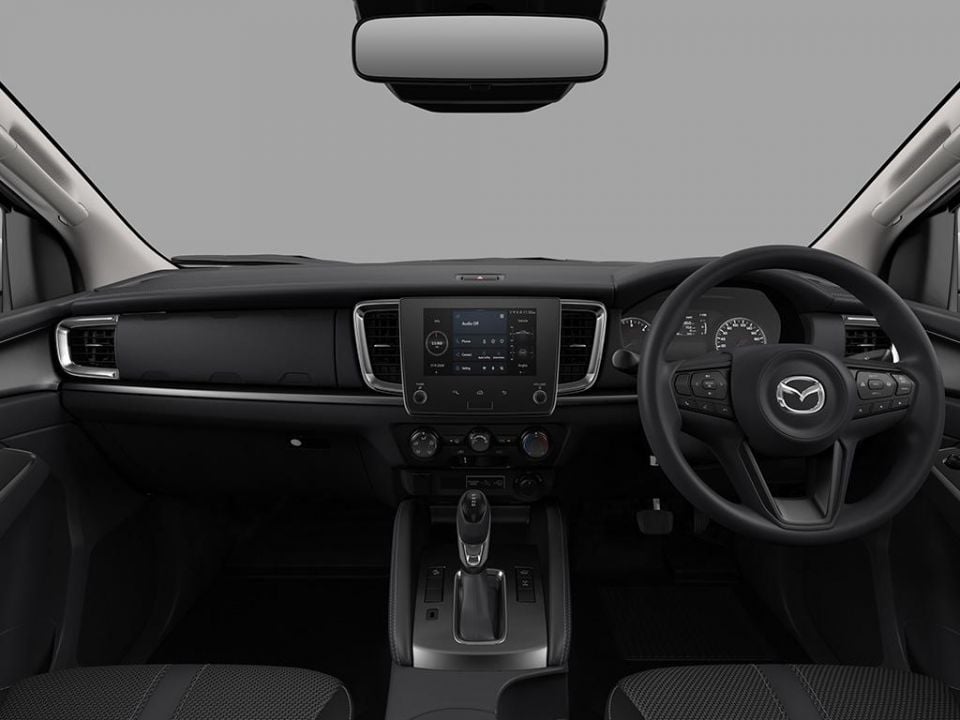The 2026 Mazda BT-50 is now available with new 2.2-litre four-cylinder turbo-diesel engine to replace the previous entry-level 1.9-litre engine, bringing higher outputs, lower fuel consumption, and a 3500kg braked towing capacity across the range, but a $1500 price increase.
Available only in the entry-level XS equipment grade starting with the 4×2 single-cab/chassis variant priced at $37,900 before on-road costs, it produces 120kW of power and 400Nm of torque – gains of 10kW and 50Nm over the 1.9-litre four-cylinder turbo-diesel it replaces.
While peak power arrives at the same 3600rpm, the higher torque output peaks from 1600 to 2400rpm compared to the 1.9L engine’s 1800-2600rpm spread.
The same engine, codenamed RZ4F-TC, will also be available from October in the Isuzu D-Max, with which the BT-50 is twinned and produced alongside in Thailand, with the two utes using the same platform and engines.
CarExpert can save you thousands on a new car. Click here to get a great deal.
In the Mazda, it’s offered exclusively in four variants: the entry-level XS Single Cab Chassis 4×2, the XS Dual Cab Pickup 4×2, the XS Dual Cab Chassis 4×2 and the XS Dual Cab Pickup 4×4.
All four model grades command the same $1500 price premium over their 1.9L-engined predecessors, but also cost more than equivalent variants of the D-Max, which starts at $36,200 before on-roads or $36,990 drive-away.
The new 2.2L turbo-diesel is teamed with an eight-speed automatic as standard (unlike the D-Max, the BT-50 was already a manual-only model), while the more powerful 3.0-litre four-cylinder turbo-diesel in higher-grade BT-50s continues with a six-speed automatic.
The new 2.2L engine also comes with an engine idle stop/start system as standard to lower fuel use and CO2 emissions by up to 0.7L/100km and 17g/km respectively, with the most efficient BT-50 XS dual-cab pickup variant now offering a combined fuel consumption figure of 6.3L/100km and CO2 emissions of 167gkm – down from 7.0L/100km and 184g/km.

While the previous entry-level 1.9L SX Single Cab Chassis offered a 3000kg braked towing capacity, Mazda says the new engine brings a 3500kg tow rating, meaning the entire BT-50 lineup – regardless of engine or body style – now offers the benchmark figure, matching its Ford Ranger and Toyota HiLux rivals.
However, the XS Single Cab Chassis has a reduced payload – down from 1379 to 1357kg – although this remains the highest payload for the BT-50 lineup.
The update also brings alloy rather than steel wheels for the XS Dual Cab Pickup (other versions of the XS stick with steel wheels), while XTR and GT 4×4 dual-cab/chassis variants now come with an integrated tow bar as standard.
Mazda has also fitted a stop/start system to all 3.0L versions of the BT-50, which is claimed to improve fuel-efficiency by as much as 11 per cent. Some versions lower their combined fuel consumption by 0.9L/100km to 7.1L/100km and their CO2 emissions by 20g/km to 187g/km, while others are 0.2L/100km and 3g/km more efficient (now 7.8L/100km and 204g/km).
| 2026 Mazda BT-50 | Price before on-road costs |
|---|---|
| Single Cab Chassis XS 4×2 2.2L AT | $37,900 |
| Single Cab Chassis XT 4×2 3.0L AT | $40,400 |
| Freestyle Cab Chassis XT 4×2 3.0L AT | $44,000 |
| Dual Cab Chassis XT 4×2 3.0L AT | $47,610 |
| Dual Cab Pickup XS 4×2 2.2L AT | $46,710 |
| Dual Cab Pickup XT 4×2 3.0L AT | $49,210 |
| Dual Cab Pickup XTR 4×2 3.0L AT | $54,240 |
| Single Cab Chassis XT 4×4 3.0L AT | $48,250 |
| Freestyle Cab Chassis XT 4×4 3.0L AT | $52,000 |
| Dual Cab Chassis XS 4×4 2.2L AT | $53,120 |
| Dual Cab Chassis XT 4×4 3.0L AT | $55,620 |
| Dual Cab Chassis XTR 4×4 3.0L AT | $61,100 |
| Dual Cab Chassis GT 4×4 3.0L AT | $64,520 |
| Dual Cab Pickup XS 4×4 2.2L AT | $54,720 |
| Dual Cab Pickup XT 4×4 3.0L AT | $57,220 |
| Dual Cab Pickup XTR 4×4 3.0L AT | $63,200 |
| Dual Cab Pickup GT 4×4 3.0L AT | $66,620 |
| Dual Cab Pickup SP 4×4 3.0L AT | $71,950 |
MORE: Explore the Mazda BT-50 showroom